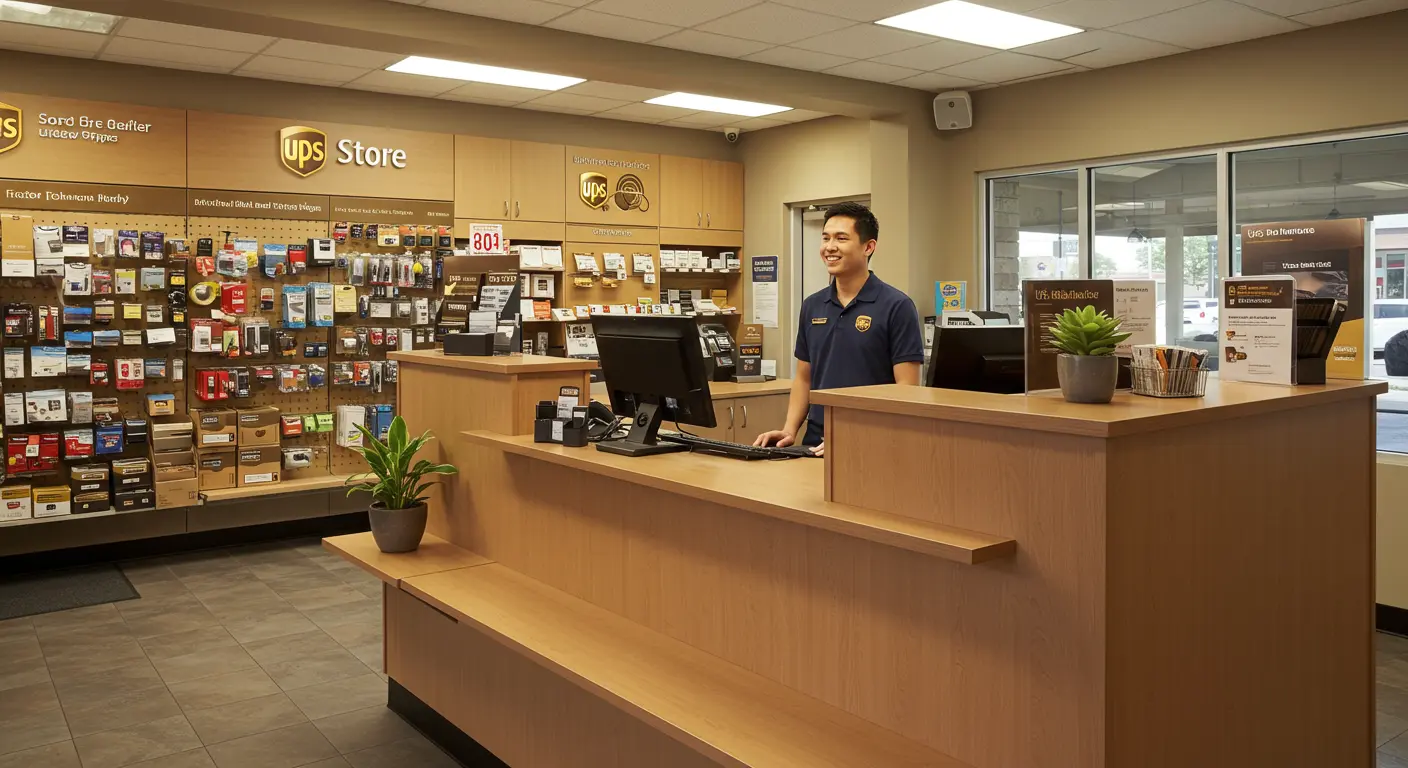UPS Store Franchise Requirements – Complete Guide
Overview of UPS Store Franchise Requirements
Becoming a UPS Store franchise owner presents an exciting opportunity to partner with a leading American retail brand in the shipping, printing, and business services sector. However, prospective franchisees must meet comprehensive requirements before starting this business venture.
The franchise program’s foundation rests on an initial franchise fee—your gateway to operating under The UPS Store’s prestigious brand. This investment unlocks access to their proven business model, proven proprietary systems, and essential initial training.
Financial qualifications represent just one piece of the puzzle. The UPS Store actively seeks franchisees who demonstrate strong business skills, exceptional customer service capabilities, and unwavering commitment to established procedures. While previous business ownership certainly helps, it’s not required—the company’s comprehensive training program bridges any experience gaps.
Financial Requirements for UPS Store Franchise
Opening a UPS Store franchise requires significant upfront investment. Prospective franchisees must prepare for significant initial investments alongside ongoing financial obligations that sustain long-term business success.
The total investment required typically spans from $216,417 to $608,975—a considerable range reflecting variables like location desirability, store size, and local market dynamics. This comprehensive figure encompasses critical startup elements: equipment, inventory, site improvements, and essential working capital.
Financial prerequisites are equally demanding. Candidates need a minimum net worth of $150,000, plus $60,000-$100,000 in readily available liquid assets. These requirements exist because This financial foundation ensures you can successfully launch your business and handle the challenges of the initial ramp-up period.
Though The UPS Store doesn’t directly offer financing, they maintain partnerships with third-party lenders well-versed in their franchise model. Additionally, qualified veterans may receive discounts on the initial franchise fee through The UPS Store’s participation in the Veteran program, reflecting the company’s commitment to supporting military veterans in business ownership.
Initial Franchise Fee Breakdown
| Cost Component | Estimated Range | Notes |
|—|—|—|
| Initial Franchise Fee | $9,950 – $29,950 | The standard fee is typically at the higher end of this range. Lower-cost options may apply in specific circumstances. |
| Equipment & Technology | $65,000 – $95,000 | Includes computers, POS systems, printers, and software. |
| Store Build-Out & Improvements | $50,000 – $250,000 | Varies significantly based on site condition, size, and location. |
| Initial Inventory & Supplies | $5,000 – $10,000 | Covers packaging materials, shipping supplies, and retail products. |
| Additional Funds (3 months) | $40,000 – $75,000 | Working capital for rent, payroll, and other initial expenses. |
| Total Estimated Investment |$216,417 – $608,975 | This range excludes costs associated with purchasing real estate. |
Ongoing Fees and Royalties
Operating a UPS Store franchise involves several recurring financial commitments that directly impact your bottom line:
Prospective franchisees should factor these ongoing fees—totaling approximately 11% of gross revenue—into their financial projections early. Don’t forget to account for your location’s operating expenses as well.
Training and Support for Franchisees
The UPS Store’s franchise system delivers comprehensive training and ongoing support designed to provide franchisees with essential knowledge and resources. Whether you’re a seasoned entrepreneur or new to the shipping and printing industries, their support structure sets you up for success.
New franchisees complete thorough training that covers every operational angle:
The support infrastructure extends far beyond your grand opening, providing ongoing access to:
Additionally, the franchisor provides invaluable assistance with site selection, lease negotiation, and store design. Their extensive real estate expertise helps franchisees secure prime locations that drive customer traffic and profitability.
Operational Requirements for UPS Store Franchise
Operating a UPS Store requires following to the franchisor’s operational standards—a non-negotiable requirement that ensures brand consistency across the entire network. This includes mandatory use of proprietary software and systems.
Franchisees must maintain specified business hours, including weekends, while keeping their store in pristine condition. Brand standards for cleanliness and visual merchandising aren’t suggestions—they’re requirements.
Staff management becomes a critical responsibility. Franchisees must hire, train, and manage employees capable of handling customer volume efficiently, leveraging the comprehensive training resources the franchisor provides.
Effective inventory management proves essential for smooth operations. Franchisees must maintain adequate stock levels while purchasing most supplies from approved vendors—a requirement that ensures consistent quality across all locations.
Participation in system-wide initiatives isn’t optional. The UPS Store franchisees must actively engage in marketing campaigns, promotional offers, and operational updates. This collective participation maintains brand consistency and ensures customers enjoy similar experiences regardless of location. Franchisees who effectively balance operational requirements with cost management usually see the best financial results.
Location Types for UPS Store Franchise
The UPS Store provides remarkable flexibility through several distinct location types:
The franchisor doesn’t leave location selection to chance. They provide expert support through demographic analysis, site selection guidance, and lease negotiation assistance—all designed to optimize your location for maximum success.
Franchise Agreement and Terms
The franchise agreement is a binding contract that details both parties’ rights and responsibilities. The initial term typically spans 10 years—providing franchisees substantial time to develop and grow their business.
Franchisees maintaining good standing can typically renew their agreement for two consecutive 5-year terms. However, renewal eligibility hinges on consistent compliance with operational standards and timely fee payments.
The franchise agreement covers crucial provisions including territorial rights, transfer options, and termination conditions. While The UPS Store typically grants protected territories to prevent market oversaturation, specific boundaries vary based on population density and market characteristics. The agreement also details circumstances under which franchisees may sell or transfer their business to qualified buyers—subject to franchisor approval, naturally.
Prospective franchisees should thoroughly review the franchise agreement with qualified legal counsel before signing. This comprehensive document covers numerous operational aspects: required business hours, approved products and services, advertising participation requirements, and dispute resolution procedures. Understanding these obligations is important for making an informed investment decision.
The Franchise Disclosure Document (FDD) offers important details and must be delivered to prospects at least 14 days before signing any binding agreement. This federally mandated document includes comprehensive information about the franchisor’s background, litigation history, financial performance representations, and a complete copy of the franchise agreement.
Benefits of Owning a UPS Store Franchise
The main benefit is The UPS Store’s powerful brand recognition—consistently ranked among top retail franchises. This reputation attracts customers while building immediate trust and credibility.
The multiservice business model generates diverse revenue streams that help stabilize income throughout various market conditions. Core services include:
Franchisees also leverage extensive marketing support through the national advertising fund. These campaigns provide marketing reach that independent owners can’t match.
The comprehensive training and ongoing support system significantly reduces the learning curve—particularly valuable for first-time entrepreneurs entering unfamiliar territory.
Ambitious entrepreneurs can explore multi-unit development opportunities. Successful franchisees often expand their portfolio by opening additional locations, creating economies of scale in management, marketing, and operations. The corporate retail solutions program opens another growth avenue by connecting franchisees with business accounts that generate consistent revenue through regular shipping and printing needs.
Yes, the investment is substantial. The combination of established brand recognition, proven business model, and comprehensive support creates a more predictable path to success than launching an independent startup from scratch.






